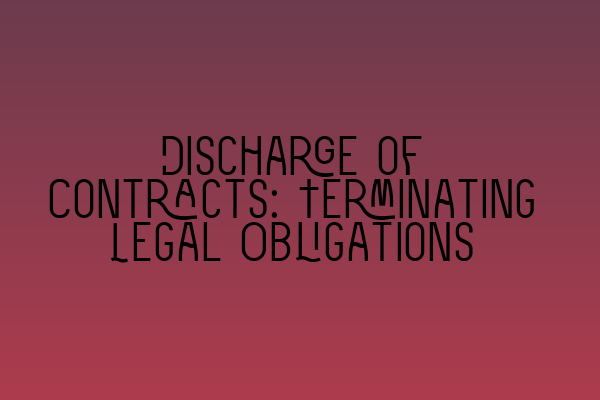Discharge of Contracts: Terminating Legal Obligations
In the world of contract law, one of the most significant concepts is the discharge of contracts. This refers to the termination of legal obligations that arise from a contract. It is crucial for parties involved in a contract to understand the various methods of discharge, as it directly affects their rights and liabilities. In this article, we will explore the different ways in which contracts can be discharged and provide valuable insights to help you navigate this complex legal landscape.
1. Performance
The most straightforward way to discharge a contract is through the complete performance of its terms. When both parties fulfill their obligations as agreed upon, the contract comes to an end. This is often the ideal outcome, as it ensures that all parties have upheld their responsibilities and obtained the benefits they sought through the agreement. However, it is essential to note that if there is any failure to perform, it may lead to a breach of contract and subsequent legal consequences. Click here to learn more about the impact of frustration on contractual obligations.
2. Agreement
In certain situations, the parties involved may mutually agree to discharge the contract. This can occur through a new contract, known as a ‘novation,’ where the original obligations are replaced by new ones. Alternatively, the parties may enter into a ‘rescission,’ which effectively cancels the original contract. In both cases, the agreement of all parties is necessary to validly discharge the contract. It is important to consult legal professionals to ensure that these processes are properly executed and legally binding.
3. Operation of Law
Contracts can also be discharged through the operation of the law. This can occur in several ways, including:
- Frustration: Sometimes, unforeseen circumstances may occur that make it impossible to fulfill the terms of the contract. These situations are referred to as ‘frustration’ and can result in the automatic termination of the contract. To learn more about how frustration impacts contractual obligations, check out our Legal Insights article.
- Illegal Contracts: Contracts that are formed for illegal purposes are considered void from the beginning and cannot be enforced. It is important to ensure that any contracts you enter into comply with the relevant laws and regulations.
- Bankruptcy: If one of the parties involved in a contract becomes bankrupt, it can lead to the discharge of the contract. Bankruptcy laws vary from jurisdiction to jurisdiction, so it is vital to seek legal advice to understand the implications in your specific situation.
- Death: In the unfortunate event of one of the parties passing away, the contract may be discharged unless there are specific provisions in place for its continuation in such circumstances.
4. Breach
A contract can be discharged through a breach by one of the parties. This occurs when one party fails to fulfill their obligations as outlined in the contract, giving the other party the right to terminate the agreement. The innocent party may choose to seek damages for the breach of contract or pursue specific performance. It is crucial to understand the specific terms and conditions regarding breaches outlined in the contract to determine the appropriate course of action.
Understanding the various methods of discharging contracts is essential in navigating the complex world of contract law. Whether through performance, agreement, operation of the law, or breach, discharging a contract requires careful consideration and knowledge to ensure that rights and liabilities are appropriately addressed. To enhance your understanding of contractual clauses and hidden meanings, we recommend reading our article on Interpreting Contractual Clauses: Unlocking the Hidden Meanings.
For entrepreneurs and business owners, it is vital to be aware of the legal aspects of business contracts. To gain key considerations in drafting and negotiating contracts, click on Legal Aspects of Business Contracts: Key Considerations for Entrepreneurs.
Additionally, if you want to delve deeper into the understanding of agreements in contract law, we invite you to read our article on Agreements in Contract Law: Understanding Its Various Types.
Finally, let’s not forget the importance of consideration in contracts, which forms the basis of contractual exchange. To grasp the essentials of consideration, check out our article on Essentials of Consideration: Understanding the Basis of Contractual Exchange.
We hope this article has provided you with valuable insights into the discharge of contracts and the various methods of terminating legal obligations. For specific legal advice on your unique situation, consult a reputable contract law solicitor who can guide you through the complexities of contract termination.
